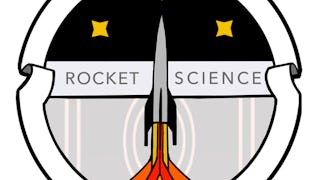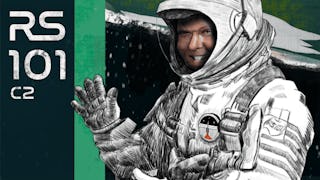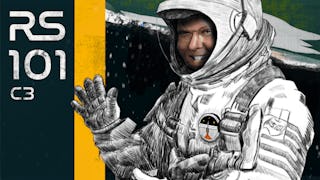Why are rockets so big? Is there gravity in space? How does a rocket engine even work? In this course, you’ll explore the major concepts of rocket science, including orbital dynamics, velocity, and different types of engines that help propel a rocket out of Earth’s atmosphere. Determine how rocket scientists use formulas and Newton’s laws to propel rockets off the ground and accelerate them to their destination. Explore how and why rockets have stages, including how rocket scientists choose between solid and liquid engines for rockets. With The Basics of Rocket Science, you’ll even get an inside look at how we might get humans to Mars, an advancement in rocket science that could change humanity's future.



The Basics of Rocket Science
This course is part of Rocket Science 101 Specialization

Instructor: Aaron Ridley
2,996 already enrolled
Included with 
(32 reviews)
Recommended experience
What you'll learn
Describe different orbits and how spacecraft can use orbit changes to get from one place to another
Determine how much rocket fuel is needed to lift different rockets off the ground and put them into orbit
Describe the costs and benefits of different types of rocket engines and designs
Skills you'll gain
Details to know

Add to your LinkedIn profile
20 assignments
See how employees at top companies are mastering in-demand skills

Build your subject-matter expertise
- Learn new concepts from industry experts
- Gain a foundational understanding of a subject or tool
- Develop job-relevant skills with hands-on projects
- Earn a shareable career certificate


Earn a career certificate
Add this credential to your LinkedIn profile, resume, or CV
Share it on social media and in your performance review

There are 4 modules in this course
Welcome to the first module of the Basics of Rocket Science course, where we will dive into the fundamental concepts of motion and forces. In this module, we will cover a range of topics, including position, velocity, and acceleration, Newton's Laws and Rocket Science, and the critical concept of thrust. Whether you are an aspiring rocket scientist, aerospace engineer, or simply a curious mind eager to explore the mysteries of space, this module will provide you with a solid foundation to understand the key concepts of motion and forces in the world of rocket science. So, let's strap in and get ready for an exciting journey into the basics of rocket science!
What's included
11 videos3 readings4 assignments1 discussion prompt
Welcome to the second module of the Basics of Rocket Science course, where we will delve into the fascinating world of orbits. In this module, we will cover a range of topics, including what an orbit is, escape velocity, and the different types of orbits that exist. So, get ready to discover the mysteries of orbits and the incredible technology that makes it all possible. Let's dive in!
What's included
13 videos1 reading6 assignments
Welcome to the third module of the Basics of Rocket Science course, where we will explore the fascinating world of rocket engines. In this module, we will cover a range of topics, including mass flow rate vs. exhaust velocity, jet engines, solid engines, and liquid engines. By the end of this module, you will have a deep understanding of the fundamentals of rocket engines and how they are critical to modern technology and space exploration. So, get ready to dive into the world of rocket engines and discover the incredible technology that makes space exploration possible. Let's blast off!
What's included
13 videos1 reading5 assignments
Welcome to the fourth and final module of the Basics of Rocket Science course, where we will explore the exciting future of rocket science. In this module, we will cover a range of topics, including electric engines, big guns and lasers, other engines such as nuclear, and going to Mars and back. By the end of this module, you will have a deep understanding of the future of rocket science and how it will shape our understanding of the universe and our place in it. So, get ready to explore the cutting edge of rocket science and discover the incredible possibilities that lie ahead. Let's embark on this final journey together!
What's included
13 videos2 readings5 assignments1 discussion prompt
Instructor

Offered by
Explore more from Physics and Astronomy


University of Michigan


Yale University


University of Michigan


University of Michigan
Why people choose Coursera for their career




Learner reviews
32 reviews
- 5 stars
90.62%
- 4 stars
9.37%
- 3 stars
0%
- 2 stars
0%
- 1 star
0%
Showing 3 of 32
Reviewed on Mar 9, 2024
Tough one explained in detail covering the basics from physics, space, engines and rocket future's

Open new doors with Coursera Plus
Unlimited access to 10,000+ world-class courses, hands-on projects, and job-ready certificate programs - all included in your subscription
Advance your career with an online degree
Earn a degree from world-class universities - 100% online
Join over 3,400 global companies that choose Coursera for Business
Upskill your employees to excel in the digital economy
Frequently asked questions
Access to lectures and assignments depends on your type of enrollment. If you take a course in audit mode, you will be able to see most course materials for free. To access graded assignments and to earn a Certificate, you will need to purchase the Certificate experience, during or after your audit. If you don't see the audit option:
The course may not offer an audit option. You can try a Free Trial instead, or apply for Financial Aid.
The course may offer 'Full Course, No Certificate' instead. This option lets you see all course materials, submit required assessments, and get a final grade. This also means that you will not be able to purchase a Certificate experience.
When you enroll in the course, you get access to all of the courses in the Specialization, and you earn a certificate when you complete the work. Your electronic Certificate will be added to your Accomplishments page - from there, you can print your Certificate or add it to your LinkedIn profile. If you only want to read and view the course content, you can audit the course for free.
If you subscribed, you get a 7-day free trial during which you can cancel at no penalty. After that, we don’t give refunds, but you can cancel your subscription at any time. See our full refund policy.
More questions
Financial aid available,

